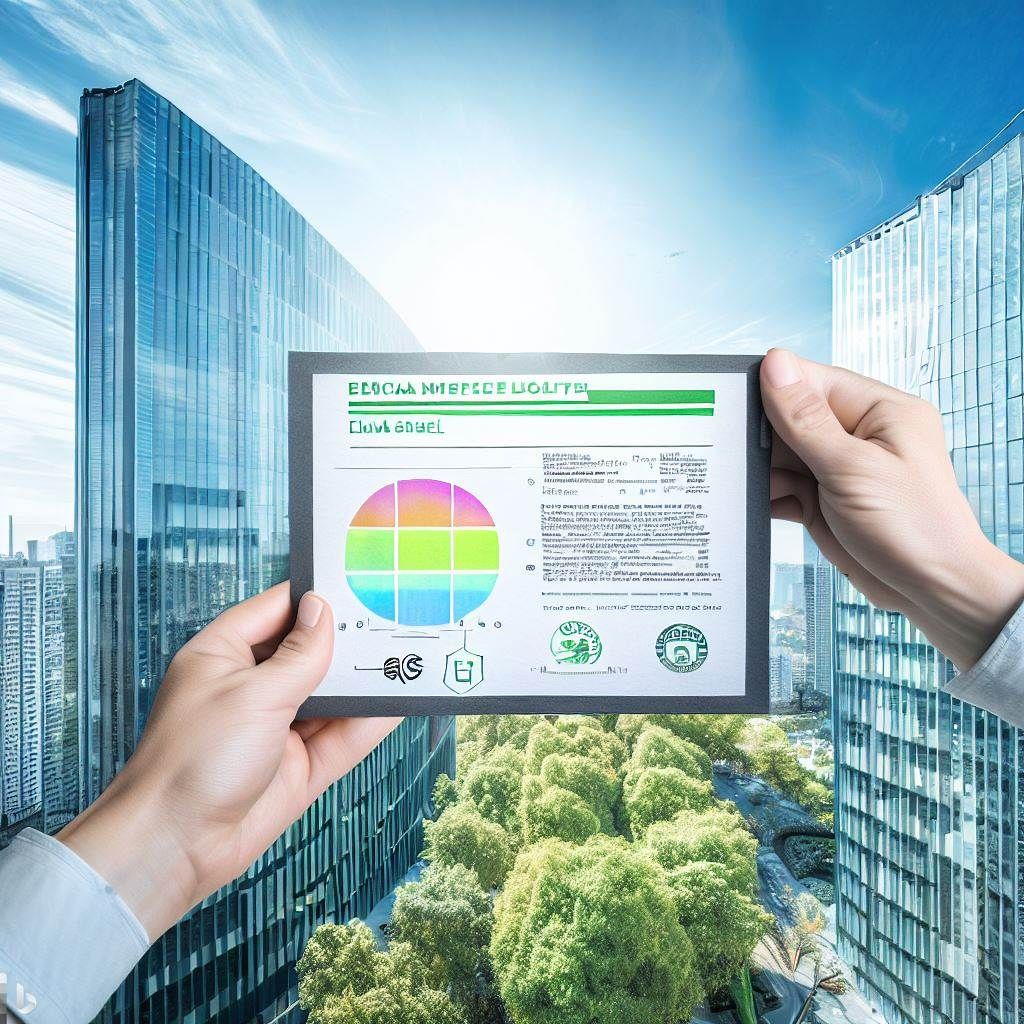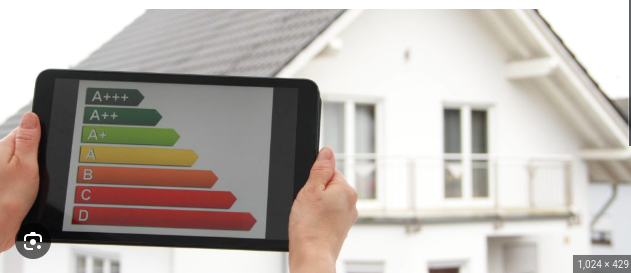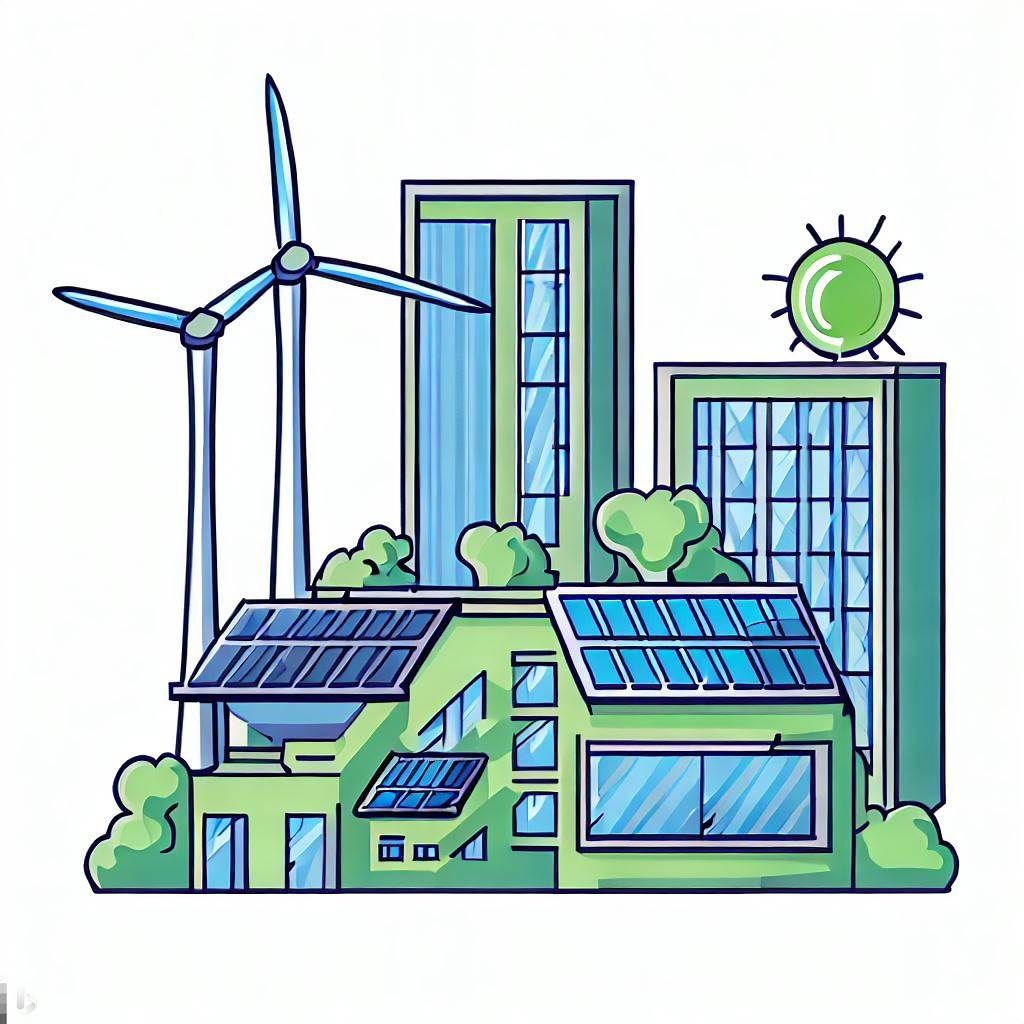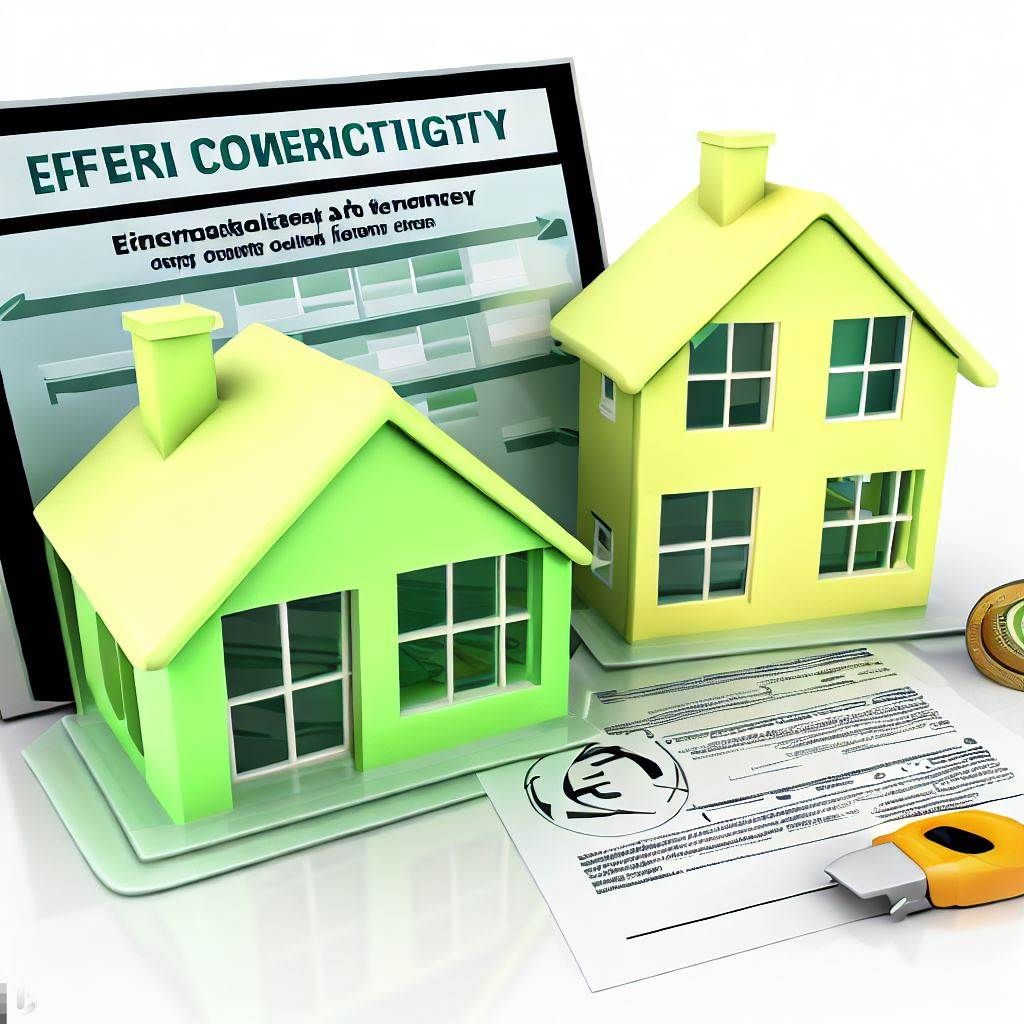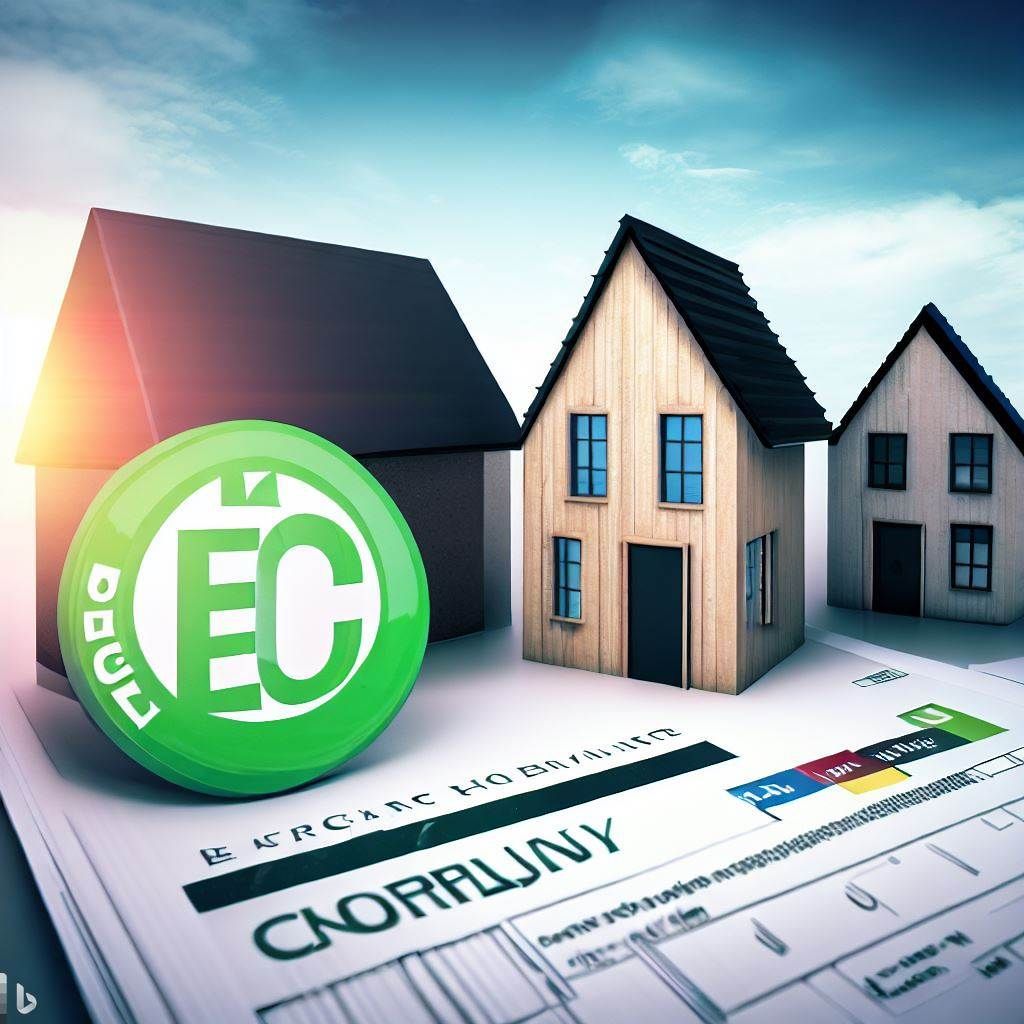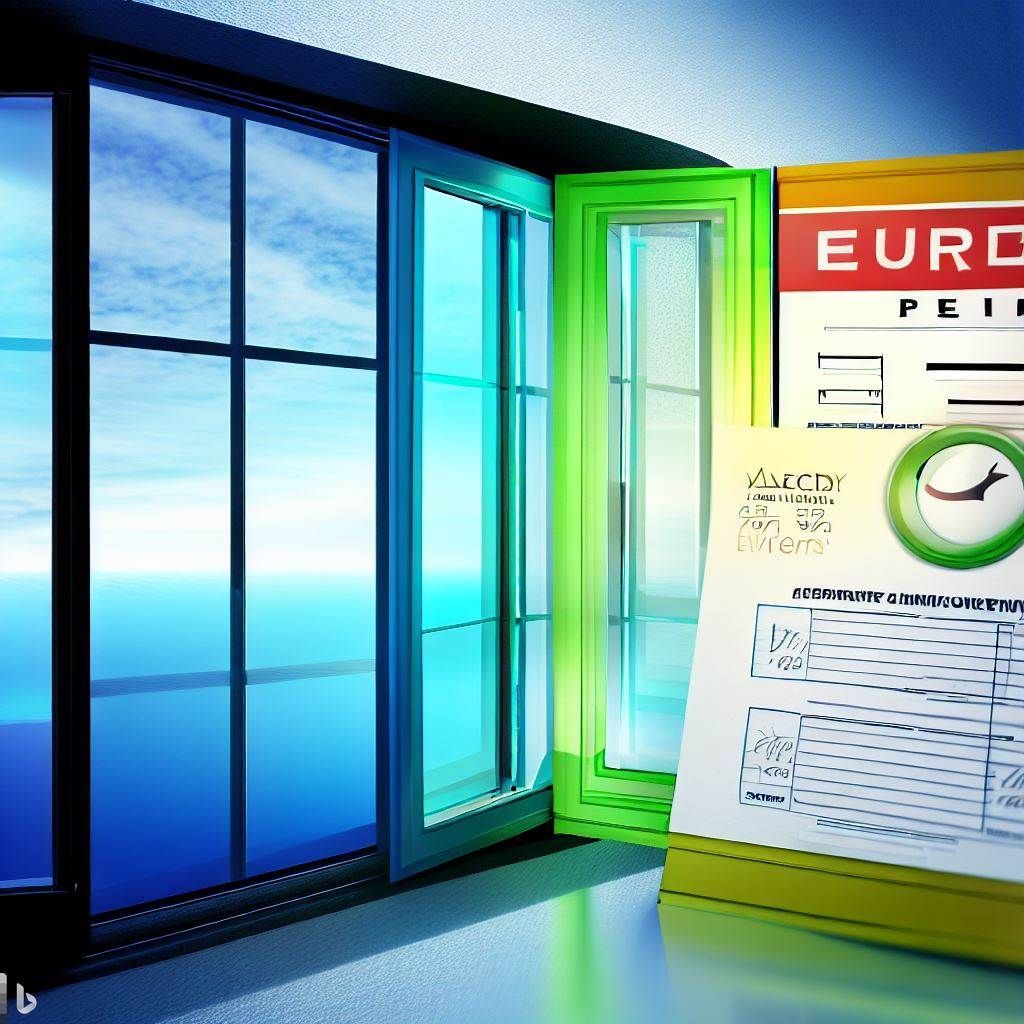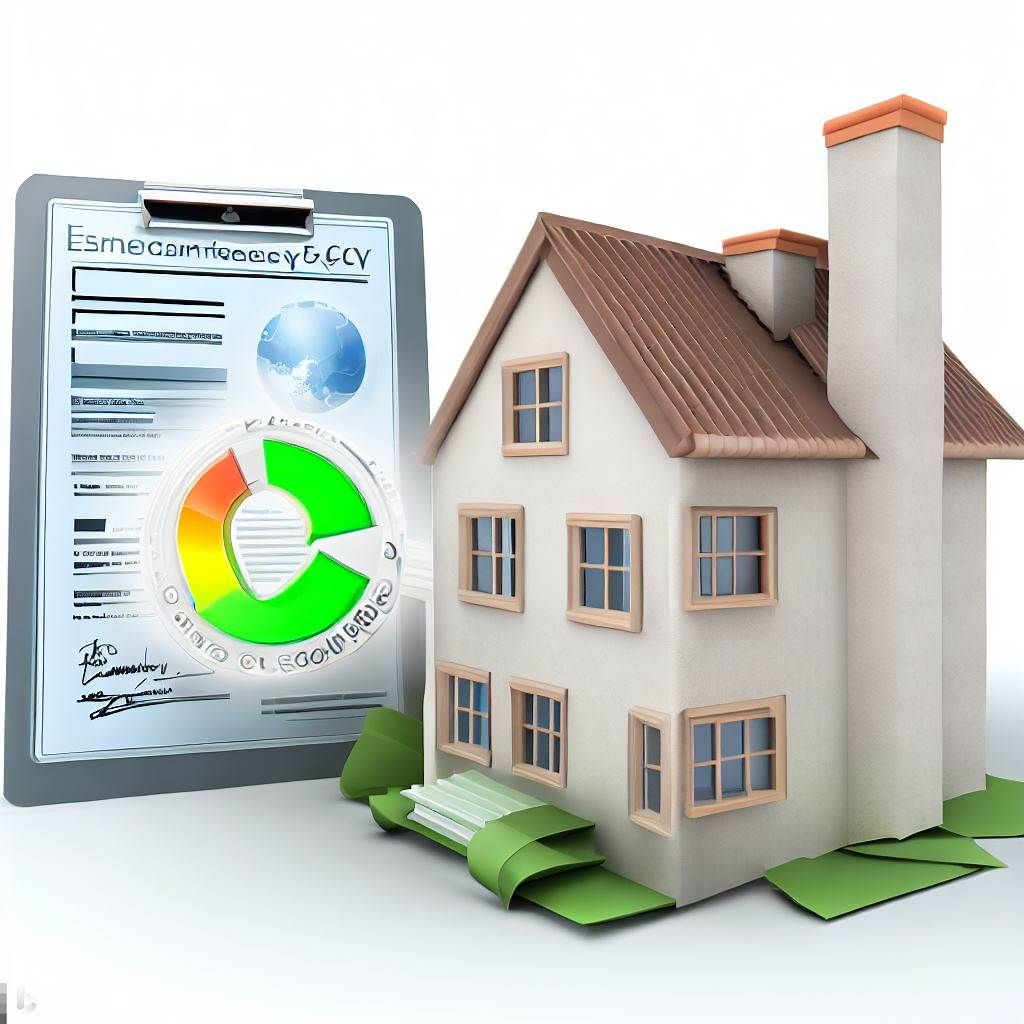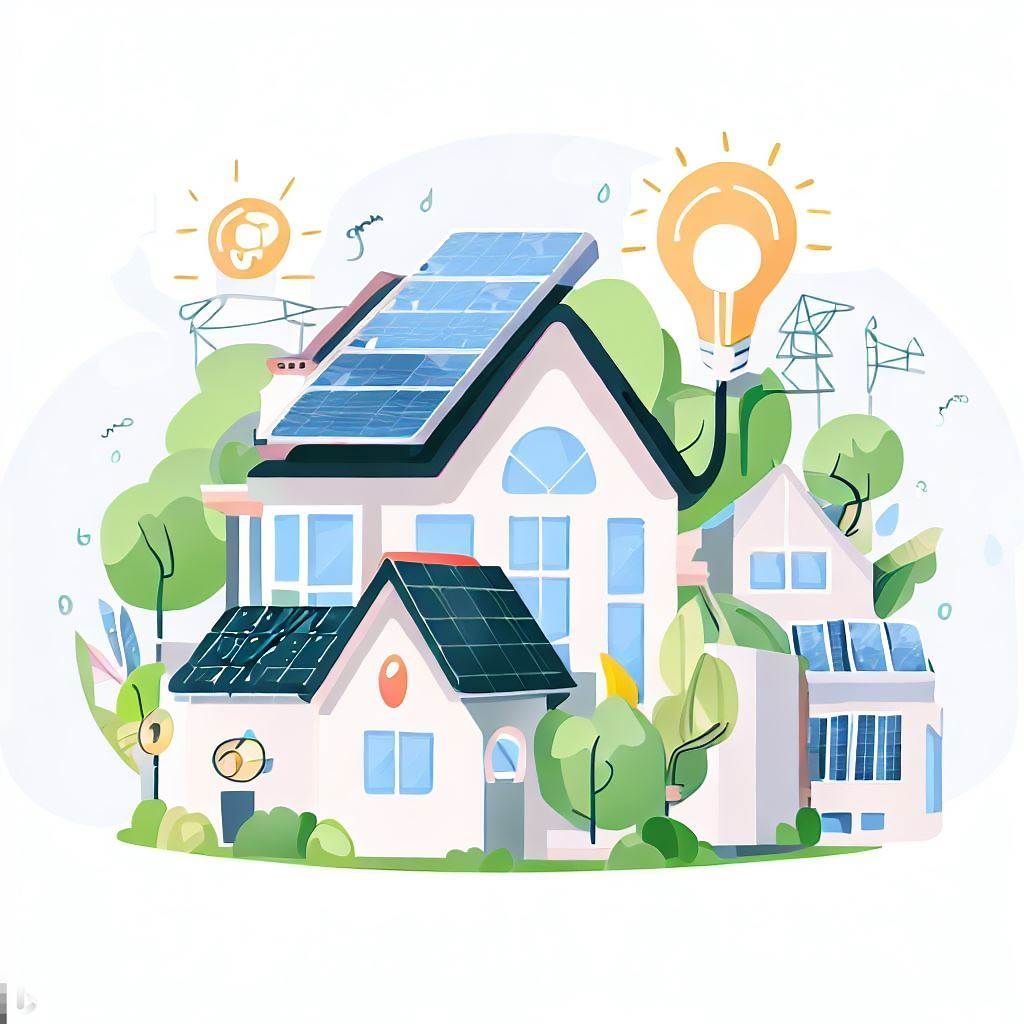Unlocking a Sustainable Future: The Value of EPC Courses for Energy Efficiency and Green Building Practices
My Detailed EPC Course Guide About Unlocking A Sustainable Future.

In today's world, where sustainability and energy efficiency are becoming increasingly important, the Energy Performance Certificate (EPC) has emerged as a crucial document. An EPC provides information about the energy efficiency of a building, helping property owners and prospective buyers make informed decisions about energy usage and costs. To ensure accurate and reliable EPC assessments, individuals with the necessary knowledge and skills are required. This is where an EPC course comes into play.
An EPC course is designed to provide comprehensive training and education on the principles, methodologies, and regulations related to energy performance assessments. It equips individuals with the expertise to conduct accurate EPC assessments and make recommendations for improving energy efficiency in buildings.
The course covers various topics, including the fundamental concepts of energy efficiency, building construction and insulation, heating and cooling systems, renewable energy sources, and energy performance regulations. Participants learn about the different rating scales and methods used to assess a building's energy efficiency and how to interpret and present the information provided in an EPC.
Moreover, an EPC course also familiarises learners with the software and tools used for EPC assessments. They gain hands-on experience in conducting energy audits, collecting data, and using advanced software to generate accurate EPC reports.
Who can benefit from an EPC course? The course is suitable for a wide range of professionals, including energy consultants, architects, surveyors, property assessors, facilities managers, and anyone involved in the construction or real estate industry. It is also beneficial for individuals seeking to enhance their knowledge and pursue a career in sustainable building practices or energy management.
Choosing the right EPC course provider is essential to ensure the quality and relevance of the training. Look for providers that are accredited by recognised organisations or governing bodies in the energy and construction sectors. Accredited courses often adhere to industry standards and are regularly updated to reflect changes in regulations and best practices.
By completing an EPC course, individuals gain a competitive edge in the job market and open doors to various career opportunities. They can work as certified EPC assessors, energy consultants, sustainability specialists, or even start their own energy assessment businesses. Furthermore, the knowledge gained from an EPC course enables professionals to contribute to environmental sustainability by promoting energy-efficient practices and helping individuals and organisations reduce their carbon footprint.
In conclusion, an EPC course provides valuable knowledge and skills necessary to perform accurate energy performance assessments and contribute to a more sustainable built environment. Whether you're looking to expand your career prospects or make a positive impact on energy efficiency, an EPC course is an excellent investment in your professional development. In the following sections, we will delve deeper into the specifics of EPC courses, explore their benefits, and provide practical advice to help you succeed in your journey towards becoming an EPC professional.
People Also Ask
How do I become EPC Certified?
How much Does It Cost To Become an EPC Assessor?
Here Is What Will Be Covered.
- The Importance of EPC (Energy Performance Certificate) in Today's World
- Exploring the Benefits of Taking an EPC Course
- Understanding the Basics: What Does an EPC Course Cover?
- EPC Course vs. EPC Certification: Understanding the Difference
- Who Should Consider Taking an EPC Course?
- How to Choose the Right EPC Course Provider
- The Role of EPC Assessors: Career Opportunities and Scope
- Real-World Applications: How EPC Course Knowledge Can Make a Difference
- Exploring the Future of EPC and Green Building Practices
- Tips for Success: Strategies to Excel in Your EPC Course
- EPC Course Case Studies: Success Stories and Lessons Learned
- Frequently Asked Questions about EPC Courses
- Exploring Additional Resources and Continuing Education for EPC Professionals
- Conclusion: The Value of an EPC Course in a Sustainable World
1.1 The Importance of EPC (Energy Performance Certificate) in Today's World
In the face of growing environmental concerns and the need to address climate change, energy efficiency has become a critical aspect of sustainable development. Buildings, in particular, contribute significantly to energy consumption and greenhouse gas emissions. To tackle these challenges, the Energy Performance Certificate (EPC) has emerged as a vital tool in assessing and improving the energy efficiency of buildings.
An EPC provides valuable information about the energy performance of a property, presenting it in a clear and standardised format. It rates the energy efficiency of a building on a scale from A to G, with A being the most energy-efficient and G being the least. This rating not only helps property owners understand the current energy efficiency level of their buildings but also allows potential buyers or tenants to compare different properties and make informed decisions based on energy performance.
One of the key benefits of an EPC is its ability to highlight potential energy-saving measures that can be implemented to improve a building's efficiency. The EPC report provides recommendations on areas such as insulation, heating and cooling systems, lighting, and renewable energy sources, guiding property owners towards cost-effective solutions for reducing energy consumption and lowering carbon emissions.
Furthermore, the EPC has a broader impact on the environment and society as a whole. By promoting energy-efficient buildings, it contributes to the reduction of greenhouse gas emissions, which play a significant role in climate change. Energy-efficient buildings consume less energy for heating, cooling, and electricity, resulting in reduced demand for fossil fuels and a decrease in harmful emissions.
From a financial perspective, the EPC can have tangible benefits for property owners and tenants. Energy-efficient buildings typically have lower energy bills, saving occupants money in the long run. Moreover, an energy-efficient property often commands a higher market value and can attract more tenants or buyers, as individuals and organisations increasingly prioritise sustainability in their decision-making.
The importance of EPC extends beyond individual properties. Governments and local authorities recognise the significance of energy efficiency in achieving their environmental targets. Many countries have implemented regulations that require properties to have an EPC before they can be sold, rented, or constructed. These regulations aim to create a more energy-efficient building stock and contribute to national efforts in reducing energy consumption and carbon emissions.
In the context of commercial buildings, EPCs are often mandatory for larger properties, such as offices, retail spaces, and public buildings. These requirements serve as a means to promote energy management and encourage businesses to adopt sustainable practices. Additionally, public buildings with low energy performance may be subject to improvement orders, motivating owners to invest in energy-saving measures.
In summary, the Energy Performance Certificate (EPC) plays a crucial role in today's world by providing a standardised assessment of the energy efficiency of buildings. It not only helps property owners understand and improve the energy performance of their properties but also guides potential buyers and tenants towards sustainable choices. Moreover, EPCs contribute to global efforts in reducing greenhouse gas emissions, promoting energy conservation, and creating a more sustainable built environment. By prioritising energy efficiency through EPC assessments, we can work towards a greener and more environmentally responsible future.
2.1 Exploring the Benefits of Taking an EPC Course
Taking an EPC (Energy Performance Certificate) course offers a range of benefits for individuals who are interested in or involved in the energy and construction sectors. These courses provide comprehensive training and knowledge that can enhance professional growth, open up new career opportunities, and contribute to a more sustainable built environment. Let's delve into the specific benefits of taking an EPC course:
- Enhanced Knowledge and Expertise: EPC courses provide in-depth knowledge and expertise in energy efficiency principles, building construction, heating and cooling systems, renewable energy sources, and energy performance regulations. Participants gain a solid understanding of the factors that influence a building's energy efficiency, as well as strategies to improve it. This knowledge is invaluable in conducting accurate energy assessments and making informed recommendations for energy-efficient building design and retrofitting.
- Professional Advancement: Completion of an EPC course can significantly enhance career prospects. The demand for professionals with expertise in energy performance assessments and sustainable building practices is on the rise. Employers across various sectors, including energy consulting firms, architectural firms, construction companies, and governmental organisations, seek individuals with EPC certification. By acquiring this qualification, professionals can differentiate themselves in the job market and increase their chances of securing rewarding positions with competitive salaries.
- Diversified Career Opportunities: An EPC course opens up a range of career opportunities in the energy and construction sectors. EPC assessors, energy consultants, sustainability specialists, project managers, and facilities managers are just a few examples of the roles individuals can pursue. These careers allow professionals to contribute to the development of energy-efficient buildings, promote sustainability practices, and make a positive impact on the environment. Moreover, the growing emphasis on energy performance assessments and certifications means that individuals with EPC qualifications can explore entrepreneurial opportunities by starting their own energy assessment businesses.
- Compliance with Regulations: EPCs have become a regulatory requirement in many countries for property sales, rentals, and new constructions. By obtaining EPC certification through a recognised course, individuals ensure compliance with these regulations. This is particularly important for professionals involved in property transactions, real estate agencies, and construction projects. Having the necessary knowledge and certification enables them to carry out assessments accurately, provide legally required information to clients, and avoid potential legal issues.
- Cost Reduction and Savings: An EPC course equips individuals with the skills to identify energy-saving opportunities and implement cost-effective measures. By conducting energy assessments and implementing the recommended improvements, property owners can significantly reduce energy consumption, leading to lower utility bills. Additionally, energy-efficient buildings have a higher market value, attracting tenants and buyers who prioritise sustainability. This can result in increased property rental income or sales prices, further benefiting property owners and investors.
- Contribution to Environmental Sustainability: Taking an EPC course goes beyond personal and professional benefits. It allows individuals to actively contribute to environmental sustainability efforts. By promoting energy-efficient building practices, EPC professionals help reduce greenhouse gas emissions and mitigate the impact of climate change. They play a vital role in creating a more sustainable built environment and fostering a culture of energy conservation and responsible resource use.
In conclusion, an EPC course offers numerous advantages for individuals interested in energy efficiency, sustainability, and the built environment. From expanding knowledge and career opportunities to cost reduction and environmental impact, the benefits are far-reaching. By acquiring the skills and certification provided by an EPC course, individuals can make a meaningful difference in their professional lives, the industry, and the wider world.
3.1 Understanding The Basics: What Does An EPC Course Cover?
An EPC (Energy Performance Certificate) course covers a wide range of topics to provide participants with a comprehensive understanding of energy efficiency principles, building assessments, and regulatory frameworks. Let's explore the key areas typically covered in an EPC course:
- Introduction to Energy Performance Certificates (EPCs): The course begins with an overview of EPCs, their purpose, and their importance in assessing the energy efficiency of buildings. Participants learn about the role of EPCs in promoting sustainable building practices, reducing energy consumption, and mitigating climate change.
- Energy Efficiency Fundamentals: Participants gain a solid understanding of energy efficiency principles, including the basics of energy consumption, energy conservation, and energy-efficient building design. They learn about the different factors that affect a building's energy performance, such as insulation, heating and cooling systems, lighting, and renewable energy sources.
- Building Construction and Insulation: This module focuses on the impact of building construction and insulation on energy efficiency. Participants learn about different construction methods, insulation materials, and techniques for reducing heat loss or gain in buildings. The course covers topics like wall insulation, roof insulation, windows, doors, and thermal bridging.
- Heating and Cooling Systems: Participants explore various heating and cooling systems commonly found in buildings. They learn about the different types of systems, including central heating, air conditioning, heat pumps, and renewable energy systems like solar thermal and geothermal. The course provides insights into system components, efficiency considerations, and the importance of proper system sizing and maintenance.
- Lighting and Electrical Systems: This module covers lighting technologies, energy-efficient lighting design principles, and the use of controls to optimise lighting energy consumption. Participants gain knowledge about the different types of lighting fixtures, energy-saving lamps, LED technology, daylight harvesting, occupancy sensors, and other lighting control strategies.
- Renewable Energy Sources: Participants learn about the integration of renewable energy sources in buildings to improve energy performance. The course provides an overview of solar photovoltaics, solar thermal systems, wind turbines, biomass systems, and other renewable technologies. Participants explore the benefits, limitations, and considerations for incorporating renewable energy into building designs.
- Energy Performance Assessment Methods: The course dives into the methodologies and procedures used for conducting energy performance assessments. Participants learn about data collection techniques, energy auditing processes, and the use of software tools for energy calculations and modelling. They gain hands-on experience in using industry-standard software to generate accurate EPC reports.
- Energy Performance Regulations and Compliance: Participants become familiar with energy performance regulations and standards applicable to buildings. The course covers national and international frameworks, including building codes, energy efficiency directives, and certification schemes. Participants learn about the legal requirements for EPC assessments, compliance obligations, and the consequences of non-compliance.
- EPC Report Interpretation and Recommendations: Participants are guided on how to interpret and analyse EPC reports. They learn to identify areas for improvement and provide recommendations to enhance a building's energy efficiency. The course emphasises effective communication of findings and recommendations to clients or stakeholders, enabling participants to convey complex information in a clear and actionable manner.
- Professional and Ethical Considerations: The course also covers professional ethics, responsibilities, and best practices for EPC assessors. Participants learn about client confidentiality, accuracy in reporting, and maintaining professional integrity. They gain insights into the importance of ongoing professional development and staying up-to-date with evolving energy performance regulations and technologies.
By covering these topics, an EPC course equips participants with the knowledge and skills necessary to conduct accurate energy assessments, generate EPC reports, and provide valuable recommendations for improving energy efficiency in buildings. Understanding these basics prepares individuals for a career in EPC assessments, energy consulting, or sustainable building practices.
4.1 EPC Course vs. EPC Certification: Understanding the Difference
When exploring the field of energy performance assessments and the associated Energy Performance Certificates (EPCs), it's important to understand the distinction between an EPC course and EPC certification. While both are related to the same domain, they serve different purposes and cater to different aspects of professional development. Let's delve into the difference between an EPC course and EPC certification:
EPC Course:
An EPC course refers to the educational program or training that individuals undertake to gain knowledge and skills in conducting energy performance assessments and generating EPC reports. It is designed to provide comprehensive training on the principles, methodologies, and regulations related to energy efficiency in buildings.
EPC courses cover a range of topics including energy efficiency fundamentals, building construction and insulation, heating and cooling systems, lighting and electrical systems, renewable energy sources, energy performance assessment methods, and compliance with energy regulations. These courses are typically delivered through classroom-based learning, online modules, or a combination of both. Participants engage in theoretical learning, practical exercises, and may even have hands-on experience with industry-standard software tools used for energy calculations and EPC reporting.
The primary objective of an EPC course is to equip individuals with the necessary knowledge and skills to perform accurate energy performance assessments, analyse building energy efficiency, and provide recommendations for improvement. Completing an EPC course demonstrates a foundational understanding of energy efficiency principles and prepares individuals for a career in energy consulting, sustainable building practices, or becoming certified EPC assessors.
EPC Certification:
On the other hand, EPC certification refers to the official recognition or accreditation awarded to individuals who have demonstrated their competence in performing energy performance assessments and generating EPC reports. Certification validates that an individual has successfully met specific criteria, such as completing an approved EPC course, passing relevant exams, and demonstrating practical competence.
EPC certification is typically issued by recognised organisations, professional bodies, or governmental bodies responsible for regulating energy performance assessments and EPCs. The certification process involves assessing the knowledge, skills, and competence of individuals in performing accurate energy assessments, interpreting EPC reports, and adhering to professional standards and ethical guidelines.
Certification provides credibility and assurance to clients, employers, and stakeholders that an individual possesses the necessary qualifications and expertise to carry out energy performance assessments and issue EPCs. It signifies a higher level of proficiency beyond completing an EPC course alone.
It's important to note that certification requirements may vary depending on the country or region. Some jurisdictions may have specific certification schemes or regulations in place, while others may rely on recognised professional bodies to issue certifications. It is advisable to research and understand the specific certification requirements and processes applicable in your area of practice.
In summary, an EPC course focuses on providing the knowledge and skills necessary for energy performance assessments and generating EPC reports. It prepares individuals for a career in the field and acts as the foundation for professional development. On the other hand, EPC certification validates the competence and expertise of individuals in performing energy assessments and issuing EPCs. Certification provides official recognition and adds credibility to an individual's professional profile. Completing an EPC course is typically a prerequisite for pursuing EPC certification, as it equips individuals with the necessary knowledge and skills required for certification.
5.1 Who Should Consider Taking an EPC Course?
An EPC (Energy Performance Certificate) course offers valuable knowledge and skills in the field of energy efficiency and building assessments. While the course is particularly beneficial for certain professionals, it is also relevant to individuals from various backgrounds who have an interest in sustainable construction, energy conservation, or career development. Here are some key groups of people who should consider taking an EPC course:
- Building and Construction Professionals: Architects, engineers, building surveyors, and construction project managers can greatly benefit from an EPC course. These professionals are involved in designing, constructing, and managing buildings, and understanding energy performance is crucial to their work. By taking an EPC course, they gain knowledge about energy-efficient design principles, building materials, and systems. This knowledge allows them to integrate energy efficiency measures into their projects and ensure compliance with energy performance regulations.
- Energy Consultants and Assessors: Individuals who are interested in pursuing a career as energy consultants or EPC assessors should strongly consider taking an EPC course. These professionals provide energy performance assessments, conduct energy audits, and generate EPC reports for residential and commercial properties. An EPC course equips them with the necessary skills to accurately assess a building's energy performance, analyse energy consumption patterns, and provide recommendations for improvement.
- Real Estate Agents and Property Managers: Real estate agents and property managers play a crucial role in property transactions and rentals. Understanding energy performance and EPCs can give them a competitive edge in the market. By taking an EPC course, these professionals can effectively communicate the energy efficiency of properties to potential buyers, tenants, and property owners. They can also advise clients on energy-saving measures and help them make informed decisions based on energy performance ratings.
- Environmental and Sustainability Professionals: Individuals passionate about environmental sustainability and interested in working in the field can greatly benefit from an EPC course. These professionals focus on promoting sustainable practices, reducing carbon emissions, and mitigating climate change. An EPC course provides them with a strong foundation in energy efficiency principles, allowing them to assess the environmental impact of buildings and contribute to sustainable development initiatives.
- Property Owners and Investors: Property owners and investors who wish to optimise their assets' energy performance and maximise returns should consider taking an EPC course. By understanding energy efficiency concepts, they can identify areas for improvement, implement energy-saving measures, and increase the value of their properties. An EPC course empowers property owners and investors to make informed decisions about energy efficiency upgrades, which can result in cost savings, higher rental incomes, or increased property resale value.
- Individuals Seeking Career Change or Skill Enhancement: Even for individuals outside the building and construction industry, an EPC course can be beneficial for career change or skill enhancement. With the increasing emphasis on energy efficiency and sustainable practices, having knowledge of EPCs and energy performance assessments can open up new career opportunities. Additionally, professionals in related fields, such as facilities management, renewable energy, or green building certification, can enhance their skill set by gaining expertise in energy performance assessments through an EPC course.
Ultimately, anyone with an interest in sustainable construction, energy conservation, or a desire to work in a field related to energy efficiency should consider taking an EPC course. Whether you are a building professional, energy consultant, real estate agent, sustainability advocate, property owner, or seeking career advancement, an EPC course provides valuable knowledge and skills that can positively impact your professional growth and contribute to a more sustainable built environment.
6.1 How to Choose the Right EPC Course Provider
Choosing the right EPC (Energy Performance Certificate) course provider is essential to ensure that you receive high-quality training and gain the necessary knowledge and skills in energy performance assessments. Here are some key factors to consider when selecting an EPC course provider:
- Accreditation and Recognition: Look for EPC course providers that are accredited or recognised by relevant industry bodies, governmental organisations, or professional associations. Accreditation ensures that the provider meets certain quality standards and follows best practices in delivering EPC courses. Recognition from reputable organisations indicate that the provider has a solid reputation and is trusted in the field.
- Course Content and Curriculum: Review the course content and curriculum offered by different providers. Ensure that the course covers all the essential topics related to energy efficiency, building assessments, and EPC regulations. Look for comprehensive courses that provide a balance between theoretical knowledge and practical application. Consider the depth of coverage and the inclusion of relevant case studies, real-world examples, and hands-on exercises to enhance the learning experience.
- Experienced and Qualified Instructors: Find out about the qualifications and experience of the instructors who will be delivering the EPC course. Experienced instructors with a background in energy efficiency, building assessments, or related fields can provide valuable insights and practical knowledge. Look for instructors who have industry experience or relevant professional certifications, as they can offer real-world perspectives and help bridge the gap between theory and practice.
- Training Delivery Methods: Consider the training delivery methods offered by the EPC course provider. Some providers offer traditional classroom-based training, while others provide online or blended learning options. Evaluate your preferences and learning style to determine which delivery method suits you best. Online courses can offer flexibility in terms of timing and location, while classroom-based courses may provide opportunities for interactive discussions and networking with other participants.
- Course Duration and Schedule: Assess the course duration and schedule to ensure that it aligns with your availability and commitments. Some EPC courses are offered as intensive programs over a few days, while others are spread out over several weeks or months. Consider the time commitment required for completing the course and ensure that it fits within your schedule. Additionally, check if the provider offers multiple course dates or options to accommodate different participants' needs.
- Support and Resources: Evaluate the level of support and additional resources provided by the course provider. A reputable provider should offer assistance during the course, such as access to instructors for questions or clarification. They may also provide learning materials, resources, or recommended readings to supplement the course content. Consider if the provider offers post-course support or opportunities for continued professional development to ensure that you can stay updated with industry advancements.
- Reviews and Recommendations: Seek reviews and recommendations from past participants or industry professionals who have completed the EPC course from the provider you are considering. Reviews can provide insights into the quality of the course content, training delivery, and overall experience. Additionally, reach out to professionals in the energy efficiency or building assessment industry to gather their opinions on reputable EPC course providers.
- Cost and Value for Money: Evaluate the cost of the EPC course and compare it with the value provided. Consider factors such as the course content, the reputation of the provider, instructor qualifications, and additional resources included. Remember that investing in high-quality training can have long-term benefits for your career and professional development. However, also be cautious of providers that significantly deviate from the average market price without reasonable justification.
By considering these factors, you can make an informed decision when selecting an EPC course provider. Remember to prioritise quality, reputation, and alignment with your learning needs and career goals. Choosing the right EPC course provider sets the foundation for acquiring the necessary skills and knowledge to excel in the field of energy performance assessments and contribute to a more sustainable.
7.1 The Role of EPC Assessors: Career Opportunities and Scope
EPC (Energy Performance Certificate) assessors play a crucial role in assessing the energy efficiency of buildings and issuing EPCs, which provide valuable information about a property's energy performance. As the demand for energy-efficient buildings continues to grow, the role of EPC assessors has become increasingly important. Let's explore the career opportunities and scope available to EPC assessors:
- Conducting Energy Assessments: The primary responsibility of an EPC assessor is to conduct energy assessments of residential and commercial buildings. They visit properties and collect relevant data on the building's construction, insulation, heating and cooling systems, lighting, and other energy-related aspects. Using specialised software tools, they analyse the data and calculate the building's energy performance rating. Based on their findings, they generate EPC reports, which include recommendations for improving energy efficiency.
- Providing Energy Efficiency Recommendations: EPC assessors play a vital role in providing recommendations to improve the energy efficiency of buildings. They identify areas for improvement and suggest measures that can help reduce energy consumption, lower carbon emissions, and enhance overall energy performance. These recommendations may include insulation upgrades, energy-efficient heating and cooling systems, lighting improvements, renewable energy integration, or behaviour modifications. By offering actionable advice, EPC assessors contribute to the adoption of sustainable building practices and help clients save energy and reduce costs.
- Ensuring Compliance with Energy Regulations: EPC assessors are responsible for ensuring that buildings comply with energy regulations and standards. They stay up-to-date with the latest energy performance regulations and guidelines established by governmental bodies or industry organisations. By conducting accurate energy assessments and issuing EPCs, assessors assist property owners, developers, and real estate agents in meeting their legal obligations and obtaining the necessary certifications or approvals for their buildings.
- Supporting Sustainable Building Practices: EPC assessors contribute to the promotion of sustainable building practices. They play a vital role in raising awareness about the importance of energy efficiency, environmental conservation, and reducing the carbon footprint of buildings. By providing energy performance ratings and recommendations, they encourage property owners and developers to incorporate energy-efficient design features, renewable energy systems, and sustainable materials into their projects. EPC assessors actively participate in creating a more sustainable built environment and mitigating the environmental impact of buildings.
- Career Opportunities: The demand for qualified EPC assessors is steadily increasing, leading to a range of career opportunities in the energy and building assessment sectors. EPC assessors can work as independent consultants, providing energy assessments and EPC services to a variety of clients. They may also be employed by energy consulting firms, real estate agencies, property management companies, or governmental organisations involved in energy efficiency initiatives. Additionally, there may be opportunities to work in conjunction with architects, engineers, or construction professionals to integrate energy efficiency measures into building designs.
- Professional Development and Specialisations: EPC assessors have opportunities for professional development and specialisation within the field. They can expand their expertise by pursuing additional training or certifications in specific areas, such as green building certifications (e.g., LEED or BREEAM), renewable energy integration, or energy modelling. Specialising in a particular sector, such as residential, commercial, or industrial buildings, can also enhance career prospects and enable assessors to cater to specific client needs.
- Future Growth and Global Relevance: The role of EPC assessors is expected to grow in the future as energy efficiency and sustainable practices become increasingly important worldwide. With the global focus on reducing carbon emissions and achieving energy targets, there is a growing need for professionals who can assess and improve the energy performance of existing buildings. Additionally, the expansion of renewable energy sources and the integration of smart building technologies present new avenues for EPC assessors to contribute to energy-efficient and environmentally friendly building solutions.
In summary, the role of EPC assessors encompasses conducting energy assessments, providing energy efficiency recommendations, ensuring compliance with energy regulations, and supporting sustainable building practices. EPC assessors have diverse career opportunities in independent consulting, energy consulting firms, real estate agencies, and governmental organisations. The field offers avenues for professional development and specialisation, and its future growth is closely tied to the increasing global focus on energy efficiency and sustainability. By actively participating in the assessment and improvement of energy performance, EPC assessors play a vital role in creating a greener and more energy-efficient built environment.
8.1 Real-World Applications: How EPC Course Knowledge Can Make a Difference
The knowledge gained from an EPC (Energy Performance Certificate) course has real-world applications that can make a significant difference in various aspects of the built environment and energy conservation. Here are some key areas where EPC course knowledge can have a tangible impact:
- Energy Efficiency in Buildings: One of the primary applications of EPC course knowledge is in improving the energy efficiency of buildings. EPC assessors, armed with their expertise, can accurately assess the energy performance of residential, commercial, and industrial buildings. They can identify areas of energy wastage, recommend energy-saving measures, and guide property owners and managers in implementing energy-efficient practices. By optimising the energy use of buildings, EPC course knowledge helps reduce carbon emissions, lower energy costs, and create healthier and more sustainable built environments.
- Sustainable Construction and Design: EPC course knowledge also plays a vital role in promoting sustainable construction and design practices. Architects, engineers, and construction professionals who have undergone EPC training can incorporate energy-efficient design principles into their projects. They can utilise innovative building materials, advanced insulation techniques, efficient HVAC (heating, ventilation, and air conditioning) systems, and renewable energy solutions. By implementing these sustainable design strategies, buildings can achieve higher energy performance ratings, reduce environmental impact, and create more comfortable and healthy spaces for occupants.
- Green Building Certifications: EPC course knowledge is valuable for professionals working towards obtaining green building certifications such as LEED (Leadership in Energy and Environmental Design) or BREEAM (Building Research Establishment Environmental Assessment Method). These certifications recognise buildings that meet specific sustainability criteria, including energy efficiency standards. With EPC course knowledge, professionals can conduct energy assessments, provide the necessary documentation and data, and ensure compliance with the certification requirements. Green building certifications enhance a building's market value, demonstrate a commitment to environmental stewardship, and attract environmentally conscious occupants or tenants.
- Compliance with Energy Regulations: EPC course knowledge equips professionals with the understanding of energy regulations and standards set by governmental bodies. Compliance with these regulations is mandatory for new construction, renovations, and property transactions. EPC assessors and professionals who have undergone EPC training can ensure that buildings meet the required energy performance standards and obtain the necessary certifications or approvals. By complying with energy regulations, buildings contribute to national and international energy reduction goals, support sustainability initiatives, and align with governmental policies for a greener future.
- Energy Conservation in Existing Buildings: EPC course knowledge is not limited to new constructions but is equally applicable to existing buildings. EPC assessors and professionals with EPC training can assess the energy performance of older buildings, identify areas for improvement, and recommend retrofitting measures. These measures may include upgrading insulation, improving lighting efficiency, replacing outdated heating and cooling systems, or integrating renewable energy sources. By implementing energy conservation measures, existing buildings can become more energy-efficient, reduce operational costs, and extend their useful life.
- Consumer Awareness and Decision-Making: EPC course knowledge can empower individuals, including property owners, tenants, and homebuyers, to make informed decisions about energy efficiency. With the knowledge gained from an EPC course, individuals can understand EPC ratings, interpret energy performance reports, and evaluate the potential energy costs associated with a property. This awareness enables them to choose energy-efficient properties, invest in energy-saving measures, and reduce their carbon footprint.
- Contributing to Sustainable Development Goals: The application of EPC course knowledge aligns with the United Nations Sustainable Development Goals (SDGs), particularly SDG 7 (Affordable and Clean Energy) and SDG 11 (Sustainable Cities and Communities). By improving energy efficiency, reducing energy consumption, and promoting sustainable building practices, EPC course knowledge contributes to global efforts to combat climate change, ensure access to affordable and clean energy, and create more sustainable urban environments.
In conclusion, the knowledge acquired from an EPC course has tangible real-world applications across multiple domains, including energy efficiency, sustainable construction, green building certifications, compliance with energy regulations, energy conservation in existing buildings, consumer awareness, and the achievement of sustainable development goals. By leveraging this knowledge, professionals can make a positive impact on the environment, create more sustainable buildings and communities, and contribute to a greener future.
9.1 Exploring the Future of EPC and Green Building Practices
The future of EPC (Energy Performance Certificate) and green building practices is poised for significant growth and transformation as societies increasingly prioritise sustainability, energy efficiency, and environmental responsibility. Here are some key trends and developments that shape the future of EPC and green building practices:
- Stricter Energy Regulations and Standards: Governments worldwide are adopting stricter energy regulations and standards to address climate change and reduce greenhouse gas emissions. This trend is expected to continue, driving the need for comprehensive energy performance assessments and EPCs. EPC assessors will play a critical role in ensuring compliance with these regulations, encouraging the construction and retrofitting of energy-efficient buildings, and helping achieve ambitious energy targets.
- Net-Zero Energy Buildings: The concept of net-zero energy buildings, which produce as much energy as they consume, is gaining momentum. As technology advances and renewable energy sources become more accessible and affordable, the construction industry is moving towards designing and constructing buildings that are not only energy-efficient but also generate their own clean energy. EPC assessors will contribute to the feasibility assessment, design, and performance evaluation of these net-zero energy buildings, further promoting sustainable practices.
- Integration of Smart Building Technologies: The integration of smart building technologies is set to revolutionise energy management and efficiency. Advanced sensors, controls, and automation systems enable real-time monitoring and optimisation of energy use in buildings. EPC assessors with knowledge of these technologies will be instrumental in evaluating their effectiveness and guiding the implementation of energy-efficient smart systems. These technologies will enable buildings to adapt to changing energy demands, optimise energy consumption, and reduce overall environmental impact.
- Circular Economy Principles: The principles of the circular economy, which aim to minimise waste, promote resource efficiency, and prioritise the reuse and recycling of materials, are becoming increasingly relevant in the construction industry. EPC assessors will play a role in assessing the environmental impact of construction materials and methods, encouraging the use of sustainable materials, and promoting the concept of a circular built environment. This approach will minimise the extraction of raw materials, reduce landfill waste, and contribute to a more sustainable and resilient construction sector.
- Enhanced Building Performance Metrics: Building performance metrics are evolving beyond energy efficiency ratings. The focus is expanding to include broader sustainability factors such as water efficiency, indoor air quality, occupant comfort, and health and well-being. EPC assessors may incorporate these metrics into their assessments, providing a holistic evaluation of a building's environmental performance. This comprehensive approach aligns with the growing emphasis on creating healthier and more sustainable buildings that prioritise occupant well-being.
- Green Building Certifications and Labels: Green building certifications and labels, such as LEED (Leadership in Energy and Environmental Design) and BREEAM (Building Research Establishment Environmental Assessment Method), are gaining popularity. These certifications recognise buildings that meet stringent sustainability criteria, including energy performance standards. EPC assessors will continue to play a vital role in assisting building owners and developers in achieving these certifications, demonstrating their commitment to sustainable practices and enhancing market competitiveness.
- Education and Professional Development: As the importance of EPC and green building practices continues to grow, education and professional development in this field will become increasingly important. Recognizing this, training programs, courses, and certifications related to EPC and green building practices will expand and evolve. This will ensure that professionals, including EPC assessors, architects, engineers, and construction specialists, have access to the necessary knowledge and skills to meet the demand for sustainable and energy-efficient buildings.
- Increased Public Awareness and Demand: The general public's awareness and demand for sustainable buildings are rising. People are becoming more conscious of the environmental impact of buildings and the importance of energy efficiency. This increased awareness will drive the demand for EPC assessments, energy-efficient properties, and green building practices. EPC assessors will play a crucial role in educating and guiding individuals, businesses, and organisations towards more sustainable choices and practices.
In conclusion, the future of EPC and green building practices is bright and promising. Stricter regulations, the pursuit of net-zero energy buildings, the integration of smart technologies, and the adoption of circular economy principles are reshaping the construction industry. EPC assessors will continue to be at the forefront of these developments, ensuring compliance with energy regulations, promoting sustainable practices, and guiding the transition to a more energy-efficient and environmentally responsible built environment.
10.1 Tips for Success: Strategies to Excel in Your EPC Course
Embarking on an EPC (Energy Performance Certificate) course is an excellent step towards acquiring valuable knowledge and skills in energy efficiency assessment and green building practices. To make the most of your EPC course and excel in your studies, consider implementing the following strategies:
- Establish Clear Goals: Start by setting clear goals for what you want to achieve from the EPC course. Whether you aim to pursue a career as an EPC assessor, enhance your existing knowledge, or contribute to sustainable building practices, having well-defined objectives will keep you motivated and focused throughout the course.
- Familiarise Yourself with Course Materials: Take the time to thoroughly review the course syllabus, study materials, and recommended readings. Familiarise yourself with the content and structure of the course to gain an understanding of what to expect. This will help you plan your study schedule effectively and ensure you cover all the necessary topics.
- Create a Study Schedule: Develop a study schedule that suits your learning style and commitments. Dedicate regular time slots for studying and stick to the schedule as much as possible. Breaking down the coursework into manageable chunks will make it easier to absorb information and retain knowledge. Consider allocating specific time for practice exercises and revisiting challenging topics.
- Actively Engage in Class: Actively participate in class discussions, group activities, and practical exercises. Engaging with your instructor and fellow classmates will not only deepen your understanding of the subject matter but also provide opportunities for collaborative learning and the exchange of ideas. Share your thoughts, ask questions, and contribute to a dynamic learning environment.
- Seek Clarification: If you come across concepts or topics that you find challenging to grasp, don't hesitate to seek clarification from your instructor or classmates. EPC courses can involve complex technical information, and clarifying doubts early on will prevent misunderstandings and ensure a solid foundation of knowledge.
- Take Advantage of Resources: Make use of all available resources provided by the course, such as textbooks, lecture notes, online materials, and supplementary resources. Explore additional references, scholarly articles, or industry publications related to energy efficiency and green building practices. Utilise online platforms, discussion forums, or study groups to connect with fellow learners and share insights.
- Practice with Sample Assessments: Practice is key to mastering the skills required in EPC assessments. Take advantage of any sample assessments or practice exercises provided by the course. Familiarise yourself with the assessment process, calculations, and report generation. Engage in hands-on exercises to gain confidence in conducting energy assessments and interpreting results.
- Stay Updated with Industry Developments: Energy efficiency and green building practices are constantly evolving fields. Stay updated with the latest industry developments, technological advancements, and regulatory changes. Follow reputable sources, attend webinars, seminars, or conferences, and join professional networks or associations related to energy efficiency and sustainable building. This will not only enhance your knowledge but also demonstrate your commitment to staying current in the field.
- Network and Seek Mentoring Opportunities: Networking with professionals in the industry can provide valuable insights and open doors to future opportunities. Attend industry events or join online communities where you can connect with EPC assessors, green building experts, and professionals working in energy conservation. Seek mentoring opportunities where experienced individuals can guide you in your career aspirations and offer practical advice.
- Embrace Continuous Learning: Completing an EPC course is just the beginning of your journey in energy efficiency and green building practices. Embrace a mindset of continuous learning and professional development. Explore advanced courses, certifications, or specialisations to further enhance your skills and stay at the forefront of industry trends.
By implementing these strategies, you can maximise your learning experience, excel in your EPC course, and lay a solid foundation for a successful career in the field of energy efficiency and green building practices.
11.1 EPC Course Case Studies: Success Stories and Lessons Learned
Case studies provide valuable insights into the practical application of knowledge gained from an EPC (Energy Performance Certificate) course. They offer real-world examples of successful energy efficiency assessments and green building practices. Let's explore some case studies that highlight success stories and lessons learned from EPC course graduates:
- Commercial Building Retrofit: A commercial office building underwent an energy efficiency retrofit after an EPC assessment conducted by an EPC course graduate. The assessment identified areas of improvement, including outdated lighting fixtures, inefficient HVAC systems, and poor insulation. The EPC course graduate recommended upgrades such as LED lighting installation, the installation of smart thermostats, and the insulation of walls and roofs. As a result, the building's energy consumption significantly decreased, leading to reduced energy costs and improved occupant comfort. This case study demonstrates the importance of comprehensive energy assessments and the impact of implementing energy-saving measures.
Key Lesson: Conducting a thorough energy assessment and considering multiple energy-saving measures can lead to significant energy efficiency improvements in commercial buildings.
- Residential Home Energy Audit: An EPC course graduate performed an energy audit for a residential home. The audit revealed air leaks, inefficient windows, and inadequate insulation. Based on the findings, the homeowner was advised to seal air leaks, upgrade windows to double-glazed units, and improve insulation in the attic and walls. After implementing these recommendations, the home's energy consumption decreased, resulting in lower utility bills and increased comfort for the occupants. This case study highlights the importance of identifying and addressing energy inefficiencies in residential properties.
Key Lesson: Identifying and rectifying energy inefficiencies in residential homes can lead to energy savings and improved comfort for homeowners.
- Green Building Certification: A construction project aimed to achieve LEED (Leadership in Energy and Environmental Design) certification. An EPC course graduate worked closely with the project team to ensure compliance with energy efficiency requirements. Through the EPC assessment, the graduate identified areas for improvement, such as optimising building envelope insulation, installing energy-efficient HVAC systems, and incorporating renewable energy sources. The project successfully achieved LEED certification, demonstrating the project team's commitment to sustainable building practices and energy efficiency.
Key Lesson: EPC course graduates play a crucial role in guiding construction projects towards achieving green building certifications by providing energy efficiency expertise and ensuring compliance with sustainability standards.
- Energy Performance Improvement in Public Buildings: An EPC course graduate conducted energy assessments for a portfolio of public buildings, including schools and government facilities. Through detailed assessments, the graduate identified opportunities for energy performance improvement, such as upgrading lighting systems, implementing energy management systems, and educating occupants on energy-saving practices. The recommendations were implemented, resulting in significant energy savings, reduced carbon emissions, and cost savings for the public sector.
Key Lesson: EPC course graduates can contribute to energy efficiency initiatives in public buildings, leading to substantial energy and cost savings for government entities.
- Energy Efficiency in Industrial Facilities: An EPC course graduate assessed the energy performance of an industrial facility, identifying opportunities for energy efficiency improvements. The graduate recommended measures such as optimising equipment and machinery, implementing energy management systems, and adopting process changes to reduce energy waste. The implementation of these measures resulted in increased energy efficiency, reduced operational costs, and enhanced sustainability for the industrial facility.
Key Lesson: EPC course graduates can apply their knowledge to improve energy efficiency in industrial settings, leading to significant cost savings and environmental benefits.
- These case studies illustrate the practical application of knowledge gained from EPC courses and the positive impact that EPC course graduates can have in various settings. They highlight the importance of comprehensive energy assessments, the implementation of energy-saving measures, and the contribution of EPC professionals in achieving energy efficiency, cost savings, and sustainability goals.
Key lessons learned from these case studies include the need for thorough assessments, the consideration of multiple energy-saving measures, collaboration with project teams, the importance of green building certifications, and the potential for energy savings in both residential and commercial buildings.
By examining these success stories and lessons learned, aspiring EPC professionals can gain a deeper understanding of the practical applications of their training and be inspired to make a difference in promoting energy efficiency and green building practices.
12.1 Frequently Asked Questions about EPC Courses
- What is an EPC course?
- An EPC (Energy Performance Certificate) course is a training program that provides individuals with the knowledge and skills required to perform energy assessments and issue energy performance certificates for buildings. These courses cover various aspects of energy efficiency, including building physics, energy calculations, renewable energy systems, and energy-saving measures.
- Who should consider taking an EPC course?
- EPC courses are beneficial for individuals interested in pursuing a career as an energy assessor, green building consultant, sustainability professional, or anyone seeking to enhance their understanding of energy efficiency and green building practices. Architects, engineers, construction professionals, and building owners/managers can also benefit from an EPC course to comply with energy regulations, improve building performance, and make informed decisions regarding energy efficiency.
- What are the prerequisites for an EPC course?
- The prerequisites for an EPC course may vary depending on the specific program. However, most courses do not require any specific academic qualifications. Basic knowledge of construction principles, energy concepts, and familiarity with building regulations can be beneficial. Some courses may have entry requirements or recommend prior experience in a related field, so it is advisable to check the course requirements before enrolling.
- What topics are covered in an EPC course?
- EPC courses typically cover a range of topics, including building energy performance assessment methodologies, energy calculations, thermal insulation, ventilation systems, heating and cooling systems, renewable energy technologies, energy regulations and standards, energy-saving measures, and the interpretation and issuance of energy performance certificates. The course curriculum aims to provide a comprehensive understanding of energy efficiency principles and practical skills required for energy assessments.
- How long does an EPC course typically take to complete?
- The duration of an EPC course can vary depending on the course provider and the level of detail covered. Generally, EPC courses range from a few days to a few weeks. Some courses may offer flexible study options, such as part-time or online learning, allowing individuals to complete the course at their own pace.
- Are there any exams or assessments in an EPC course?
- Yes, most EPC courses include assessments or exams to evaluate the understanding and competence of the participants. These assessments may include theoretical exams, practical exercises, case studies, or the completion of sample energy assessments. Successful completion of the assessments or exams is often required to obtain a certificate or qualification.
- Are EPC courses recognised or accredited?
- EPC courses are often offered by reputable training providers and institutions. It is important to choose a course that is recognised or accredited by relevant professional bodies or organisations in the field of energy efficiency and green building practices. Accreditation ensures that the course meets specific quality standards and provides a recognised qualification.
- Can I pursue a career as an EPC assessor after completing an EPC course?
- Yes, completing an EPC course can be a pathway to a career as an EPC assessor. With the knowledge and skills acquired from the course, individuals can apply for accreditation or certification as an energy assessor. This enables them to conduct energy assessments, issue energy performance certificates, and provide energy efficiency advice to building owners and occupants.
- Are there any continuing professional development (CPD) opportunities for EPC professionals?
- Yes, the field of energy efficiency is continuously evolving, and ongoing professional development is essential to stay updated with the latest industry trends, regulations, and technologies. Many EPC course providers offer CPD opportunities, such as advanced courses, workshops, seminars, and webinars, to help EPC professionals enhance their skills and knowledge.
- Will completing an EPC course guarantee me a job?
- While completing an EPC course is a valuable step towards a career in energy efficiency, it does not guarantee immediate job placement. The job market for EPC assessors may vary depending on factors such as location, industry demand, and individual qualifications. However, having an EPC qualification enhances your employability and opens up opportunities in various sectors, including construction, energy consulting, sustainability consulting, and facility management.
It is advisable to research the job market, network with professionals in the field, and gain practical experience through internships or voluntary work to increase your chances of securing employment as an EPC assessor or related roles.
13.1 Exploring Additional Resources and Continuing Education for EPC Professionals
As an EPC (Energy Performance Certificate) professional, continuous learning and staying updated with industry advancements are essential for career growth and ensuring the delivery of high-quality services. Beyond completing an EPC course, there are several additional resources and opportunities for continuing education that can further enhance your knowledge and expertise. Let's explore some of these resources:
- Professional Associations and Networks:
- Joining professional associations and networks related to energy efficiency and green building practices can provide valuable resources and networking opportunities. In the UK, associations like the Energy Institute (EI), Chartered Institution of Building Services Engineers (CIBSE), and the Association of Energy Engineers (AEE) offer access to industry publications, webinars, conferences, and networking events. Engaging with these organisations can help you stay connected with the latest developments, collaborate with industry experts, and expand your professional network.
- Online Learning Platforms:
- Online learning platforms provide a wealth of resources and courses on energy efficiency and related topics. Platforms like Coursera, Udemy, and LinkedIn Learning offer a wide range of courses on energy management, sustainable building practices, renewable energy, and green certifications. These courses can help you deepen your understanding of specific areas, acquire new skills, and earn certifications to enhance your professional profile.
- Industry Publications and Journals:
- Subscribing to industry publications and journals can keep you informed about the latest research, trends, case studies, and best practices in energy efficiency and green building. Publications like Energy and Buildings, Building and Environment, and Renewable Energy focus on topics such as energy performance assessment methodologies, building simulation, innovative technologies, and energy policy updates. Regularly reading these publications can expand your knowledge base and provide insights into emerging practices.
- Webinars and Podcasts:
- Webinars and podcasts offer convenient and accessible avenues for learning and professional development. Many organisations and industry experts host webinars on various energy efficiency topics, providing updates on regulations, showcasing case studies, and sharing practical insights. Podcasts, such as the Energy Efficiency Podcast, Green Building Matters, or The Energy Show, feature interviews with experts, discussions on industry trends, and insights into sustainable practices. Participating in webinars and listening to podcasts can broaden your knowledge, spark new ideas, and connect you with industry thought leaders.
- Specialised Certification Programs:
- Consider pursuing specialised certification programs to further enhance your expertise in specific areas of energy efficiency. Certifications like LEED (Leadership in Energy and Environmental Design), BREEAM (Building Research Establishment Environmental Assessment Method), or CEM (Certified Energy Manager) provide in-depth knowledge and recognition in green building practices, sustainability, and energy management. These certifications demonstrate your commitment to professional development and can enhance your career prospects.
- Industry Conferences and Events:
- Attending industry conferences, seminars, and events offers opportunities for networking, knowledge-sharing, and staying up-to-date with the latest industry trends. Events like Ecobuild, Energy Efficiency Exhibitions, and Sustainability Summits bring together professionals, researchers, and stakeholders in the energy efficiency and green building sectors. Participating in these events allows you to engage in discussions, learn from experts, showcase your expertise, and gain insights into emerging technologies and practices.
- Collaborative Projects and Research:
- Engaging in collaborative projects and research initiatives can provide hands-on experience and contribute to industry advancements. Partnering with universities, research institutions, or industry organisations can allow you to participate in energy efficiency research, pilot projects, or policy development. This involvement not only deepens your understanding of energy efficiency but also helps shape the future of the industry.
Remember, continuing education and exploration of additional resources are ongoing processes in the field of energy efficiency. Embrace a proactive approach to learning, stay curious, and seize opportunities to expand your knowledge, refine your skills, and contribute to the advancement of sustainable practices as an EPC professional.
14.1 Conclusion: The Value of an EPC Course in a Sustainable World
In today's rapidly evolving world, where sustainability and energy efficiency are paramount, the value of an EPC (Energy Performance Certificate) course cannot be overstated. This comprehensive training equips individuals with the knowledge and skills necessary to assess and improve the energy performance of buildings, contributing to a more sustainable future.
Throughout this blog, we have explored various aspects of EPC courses, including their importance, the topics covered, the difference between an EPC course and certification, the target audience, choosing the right course provider, the role of EPC assessors, real-world applications, future trends, tips for success, case studies, and continuing education opportunities. Collectively, these elements underline the significance of EPC courses in today's sustainable world.
By undertaking an EPC course, individuals gain a deep understanding of energy efficiency principles, regulations, and best practices. They become equipped to perform energy assessments, identify areas for improvement, recommend energy-saving measures, and issue energy performance certificates. EPC professionals play a vital role in driving the adoption of sustainable practices, reducing carbon emissions, and promoting energy-efficient buildings.
The benefits of an EPC course extend beyond individual career prospects. By increasing the number of trained professionals in the field, we create a ripple effect that positively impacts the environment, society, and the economy as a whole. Energy-efficient buildings not only reduce greenhouse gas emissions but also result in lower energy costs, improved occupant comfort, and healthier indoor environments.
Moreover, EPC courses align with global sustainability goals and governmental initiatives aimed at mitigating climate change. Governments around the world are implementing policies and regulations that prioritise energy efficiency and require energy performance certificates for buildings. By completing an EPC course, individuals contribute to these broader sustainability objectives, help meet regulatory requirements, and foster a culture of sustainability in the built environment.
In a world facing pressing environmental challenges, EPC professionals are at the forefront of creating positive change. Their knowledge and expertise enable them to make informed decisions, guide building owners and occupants towards energy-efficient practices, and contribute to the transition to a low-carbon future.
In conclusion, an EPC course is a transformative educational experience that empowers individuals to become catalysts for change. By acquiring the skills and knowledge to assess, improve, and certify the energy performance of buildings, EPC professionals make a tangible difference in creating a more sustainable world. Embracing the principles of energy efficiency and green building practices is not just a choice; it is a responsibility we owe to future generations. Together, let us embrace the value of EPC courses and work towards a sustainable, energy-efficient future.
Related Searches
